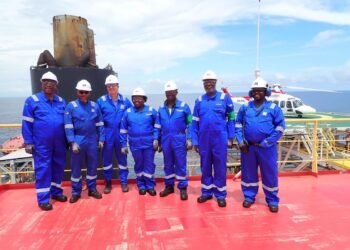A South African court has overturned environmental authorization granted to TotalEnergies SE for oil exploration in a key offshore block, dealing a significant blow to the French energy giant’s plans along the country’s west coast.
The Western Cape High Court ruled that the environmental impact assessment (EIA) for Total’s Block 5/6/7 was “deeply flawed,” finding it failed to adequately address environmental risks, legal requirements, and meaningful public participation.
The ruling follows legal action brought by Green Connection and other environmental groups, who hailed the decision as a victory for communities and the environment.
“This ruling confirms what we have been saying all along the environmental assessment process was insufficient and failed to include critical voices.”
Green Connection
TotalEnergies, along with joint venture partners including Shell Plc, has been eyeing South Africa’s offshore waters for potential large-scale oil and gas production.
The region has seen heightened interest following major discoveries across the maritime border in Namibia in 2022, transforming the area into one of Africa’s most promising exploration hotspots.
The company withdrew from Block 5/6/7 last year but has maintained that it remains committed to working within the judicial process and engaging with stakeholders.
“We remain fully committed to respecting the judicial process to its term and to engaging continuously with all our stakeholders.
“legally, assess the judgment in more detail and decide on the course of action.”
TotalEnergies
Court Opens Door for Reapplication

While the court’s decision halts the current authorization, it does not permanently bar exploration.
The judgment allows TotalEnergies to reapply for environmental clearance, provided that a new EIA process includes robust public consultation.
Shell, which the court confirmed has a “direct and substantial interest” in the matter as successor operator of the license, said it is reviewing the decision.
“South Africa is currently reliant on energy imports for many of its energy needs.
“Should viable resources be found offshore, this could significantly contribute to South Africa’s energy security and the government’s economic development programs.”
Shell
This ruling marks the latest in a series of courtroom wins for South African environmental activists who have challenged oil and gas exploration on environmental and social grounds.
Offshore drilling opponents argue that such projects threaten marine biodiversity, disrupt coastal livelihoods, and worsen climate change impacts.
Last month, Green Connection and allied groups lodged an appeal against Shell’s separate environmental authorization for the Northern Cape Ultra Deep block along the west coast.
Shell has acknowledged receiving the administrative appeals and said it will respond through the competent authority overseeing the matter.
Environmental advocates say these legal interventions are critical in ensuring that oil and gas companies comply with both national environmental laws and international climate obligations.
“South Africa’s oceans are rich in biodiversity and play a vital role in supporting coastal communities.
“Projects of this scale require thorough, transparent, and participatory assessments.”
Green Connection
Balancing Energy Security and Sustainability

South Africa’s government faces a delicate balancing act between attracting investment to boost domestic energy supply and meeting its environmental and climate change commitments.
The country imports a substantial portion of its fuel, and advocates for offshore exploration argue that local oil and gas production could reduce this dependency, create jobs, and stimulate economic growth.
However, environmentalists counter that the long-term risks to marine ecosystems and the global climate outweigh the potential short-term economic benefits.
They also question whether new fossil fuel investments align with South Africa’s stated commitment to a just energy transition and its net-zero emissions target by 2050.
The case underscores the growing influence of environmental litigation in shaping Africa’s energy future.
As oil majors increasingly turn to offshore Africa for exploration, court rulings like this could set important precedents for how environmental assessments are conducted and how communities are consulted.
For now, the West Coast project remains on hold, leaving South Africa’s broader offshore energy ambitions in a state of uncertainty.
Whether the companies decide to reapply or pivot elsewhere will depend not only on legal considerations but also on market conditions, regulatory clarity, and public sentiment.
READ ALSO: Ghana Set to Smash All 2025 Economic Targets – IC Research Hails Strong H1 Performance























